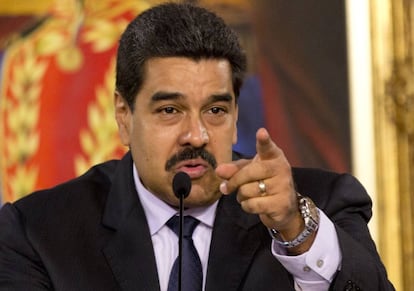Maduro purges public servants who supported recall referendum
Venezuelan president sends out list of functionaries who must leave their jobs within 48 hours
Jorge Rodríguez, the spokesman for the United Socialist Party of Venezuela (PSUV), confirmed on Monday night what until that moment had been the personal opinion of high-ranking officials, and not the official policy of the government. “By order of President [Nicolás] Maduro, five ministers have been assigned to expressly establish that people who are against the Bolivarian Revolution and the president cannot be in management positions in ministries, public institutions, state or local governments,” Rodríguez said. That is, public employees who support the recall referendum.

Rodríguez, who is also the mayor of the municipality of Libertador, also announced that the administration has decided to respond to what is being dubbed “the Taking of Caracas,” nationwide protests that the opposition has scheduled for September 1. For their part, chavista supporters will get out onto the streets in several cities for what Rodríguez called “the Taking of Venezuela.”
The executive has supplied the heads of the ministries for Food, Work, Finance and Basic Industries with a list of the names of senior officials who signed the initial petition for the recall vote. The list has also gone to the head of the Office of the President.
The regime said the president should be able to trust his senior officials, calling for resignations within 48 hours
According to the Venezuelan Constitution, the nation may hold a recall referendum once the head of state has served more than half their term and if at least 20 percent of the electorate calls for an early end to his administration.
The president’s order to officially purge the country’s administrations comes just after the National Electoral Council (CNE) accepted the opposition’s petition for a referendum that will determine the future of the Maduro administration.
The regime said the president should be able to trust his senior officials, and therefore called on those who signed the petition against him to resign within 48 hours. “Those are the civil servants who mistreat the people, who began to insult the government for which they are responsible. They are the ones who boycott work,” Rodríguez said.
This purge is the latest maneuver the administration has employed to avoid holding a recall vote before Maduro begins the fourth year of his current term. All polls say the opposition would win if elections were held today, given the misery that has defined the presidency of Hugo Chávez’s hand-picked successor.
Venezuela is the champion of the world in inflation. The country’s failure to overcome food and basic goods shortages and their dramatic consequences in daily life has shattered the allegiance the poorest felt toward the chavista regime.
This purge is the latest maneuver the administration has employed to avoid holding a recall vote
Meanwhile, the opposition has criticized CNE for collaborating with the government in delaying the verification of documents submitted to move the vote forward. On Monday, however, opposition leaders received some encouraging news. CNE said the opposition coalition, Democratic Unity Roundtable (MUD), had passed the first phase of the process. MUD had met the initial requirement: submit the signatures of one percent of voters. Starting on Tuesday, CNE has 15 days to announce the deadline for the second petition, which requires MUD to collect signatures from 20 percent of the electorate over a three-day period. According to a timetable presented on August 10, CNE could schedule a recall vote for the last week of October.
The process continues to move forward but there are unknown factors that could stop it – for example, a ruling from the Venezuelan Supreme Court. PSUV brought an appeals case before the court to challenge CNE’s approval of the first petition. The regime claims the opposition included some fake signatures on their list and it is clinging on to this claim in its attempt to stay in power.
English version by Dyane Jean François.
The old Tascón list
The chavista regime has accumulated a great deal of experience in carrying out purges. In 2003, a deputy, Luis Tascón, obtained the names of people who had signed a petition for a recall vote against then-President Hugo Chávez and published them on his website.
The administration then used that information to dismiss many public employees and keep other individuals from being hired for government jobs. That blacklist was used and talked about so often that, by the end of 2007, Chávez asked officials to “bury the Tascón list.” Not everyone followed that order. The list is still used today, albeit within a narrower scope, as a way to investigate a person’s commitment to the revolution.
Tu suscripción se está usando en otro dispositivo
¿Quieres añadir otro usuario a tu suscripción?
Si continúas leyendo en este dispositivo, no se podrá leer en el otro.
FlechaTu suscripción se está usando en otro dispositivo y solo puedes acceder a EL PAÍS desde un dispositivo a la vez.
Si quieres compartir tu cuenta, cambia tu suscripción a la modalidad Premium, así podrás añadir otro usuario. Cada uno accederá con su propia cuenta de email, lo que os permitirá personalizar vuestra experiencia en EL PAÍS.
¿Tienes una suscripción de empresa? Accede aquí para contratar más cuentas.
En el caso de no saber quién está usando tu cuenta, te recomendamos cambiar tu contraseña aquí.
Si decides continuar compartiendo tu cuenta, este mensaje se mostrará en tu dispositivo y en el de la otra persona que está usando tu cuenta de forma indefinida, afectando a tu experiencia de lectura. Puedes consultar aquí los términos y condiciones de la suscripción digital.








































